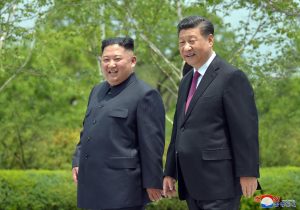ISOZAKI Atsuhito

The Rodong Sinmun is obviously the organ of the Workers’ Party of Korea, but the October 24 issue of the newspaper was so peculiar that one might assume that it had been published by the Chinese Communist Party (CCP). The top of the front page showed a congratulatory message sent by Kim Jong Un to Xi Jinping upon the latter’s election as the Party’s General Secretary at the 20th Party Congress of the CCP. Reports about Kim’s activities usually appear above the fold on the front page of the newspaper, and congratulatory messages in themselves are not unusual, but Xi Jinping is the only foreign leader to have been given the qualifier “respected.”
Not only that, but the contents were high praise indeed. For instance: “Please accept my warmest congratulations to you … I am convinced that the CCP and the Chinese people would win shining victory in the new journey for maintaining and developing socialism with the Chinese characteristics and for building a comprehensively well-off modern socialist state under your leadership.” This contrasts with the cold congratulatory message sent to the Party Congress five years ago, when relations between China and North Korea had deteriorated considerably following North Korea’s repeated nuclear tests.
Yet that wasn’t the biggest surprise. Next to the congratulatory message was an editorial titled “Celebrating the Future of the Chinese Communist Party and the People, Dedicated to the Leadership of Comrade General Secretary Xi Jinping.” Rodong Sinmun editorials are not published every day, but appear at least once every two weeks. Usually the editorial praises Kim’s achievements and calls for loyalty, appeals to the legitimacy of party policies, or promotes national unity. Rarely does it go into diplomacy or the situation in other countries. But the October 24 editorial chose to focus on China’s internal politics.
It begins with the sentence “The 20th Party Congress has successfully concluded, becoming a brilliant stop on the path of socialism with Chinese characteristics.” It goes on to heap lavish praise on Xi Jinping’s achievements in other areas, such as poverty eradication and measures against infectious diseases, before concluding, “The friendship between North Korea and China, which has a long history and tradition, will continue to be maintained under the wise leadership of the Supreme Leaders (Suryeong) of the two parties and two countries, developing further and responding to the needs of the times.” The term “Suryeong,” originally used for Kim Il Sung, is a special term that came into use for Kim Jong Il after his death and for Kim Jong Un only two years ago. But now it is also being deployed for the leader of a neighboring country.
Meanwhile, page four contained a full page titled “Comrade Xi Jinping’s Report.” This is the first time at least since the end of the Cold War that the situation in another country has been reported in such detail, and it shows just how much importance North Korea is attaching to friendly relations with China. As North Korea entered the COVID-19 pandemic at a time when its dialogues with the United States and South Korea were at an impasse, China is the only country it can rely on for economic assistance, including medical aid. Even before the pandemic, more than 95 percent of North Korea’s total trade was with China.
China-North Korea land trade has long been all but non-existent because of measures to prevent the spread of COVID, but some maritime trade has continued. North Korea’s chief import is raw materials for agricultural fertilizers. In addition, about 500,000 tons of crude oil is sent annually by pipeline. As North Korea struggles to achieve self-sufficiency, Chinese support is indispensable.
On November 22, Xi Jinping sent a reply expressing his gratitude and emphasizing the growing importance of China-North Korea relations. The more heartfelt the text, the more pressure it puts on North Korea to exercise restraint, which puts the spotlight on the seventh nuclear test, the first since September 2017. More than half a year has already passed since North Korea completed preparations for an underground nuclear test, and they are said to be in the “countdown phase.” Why has this period of self-restraint continued despite Kim Jong Un personally issuing a major directive to develop nuclear weapons at the 8th Congress of the Workers’ Party of Korea in January 2021?
The sole reason is that Beijing, which turns a blind eye to missile launches but is resolutely opposed nuclear tests, is keeping an eye on it. China is concerned about a “nuclear domino” effect, in which North Korea’s possession of nuclear weapons leads to rising public support for the acquisition of nuclear weapons in South Korea, Japan, and even Taiwan. Not only that, but since North Korea’s nuclear test site is not far from the border with China, and going ahead with the test could cause an earthquake in China, with a risk of radiation leakage.
As stated in the new nuclear doctrine presented on September 8, Kim has sole authority to make nuclear-related decisions. He continues to carefully consider whether to prioritize the political and diplomatic interests of North Korea’s friendship with China, or to favor North Korea’s own military interests, as he plans the timing of the test.
No comments:
Post a Comment